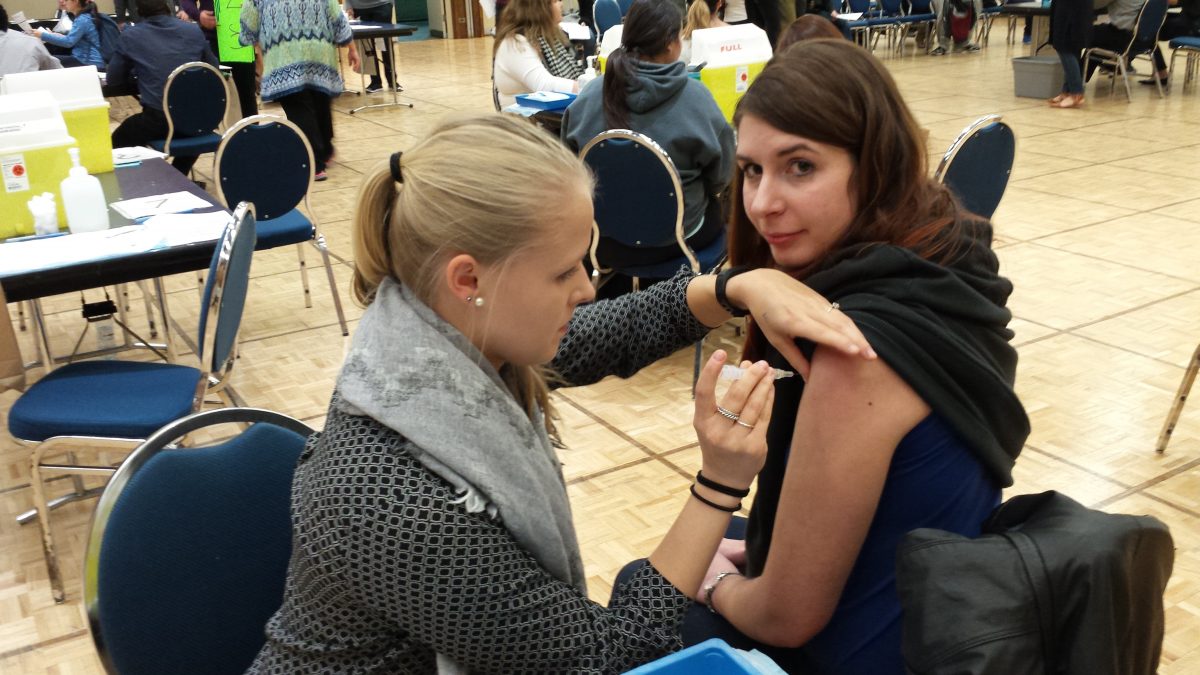
FOURTH-YEAR NURSING STUDENT NATALIA DLUGOSZ (L) IMMUNIZES STUDENT MEAGAN DIECKELT.
Nursing students take fun approach to flu battle
With a sound system pumping out upbeat music, a dinosaur mascot named Flu Rex, lots of free candy and raffle prizes, students from the College of Nursing, Rady Faculty of Health Sciences are injecting some fun into fighting the flu at their vaccine clinic.
The free clinic is on from 10 a.m. to 4 p.m. daily until Nov. 4 at the Multi-Purpose Room in University Centre on the Fort Garry campus.
On Nov. 2, Michela Troia, a first-year science student, said she liked how fourth-year nursing students were staffing and promoting the clinic with gusto.
“I love how excited they all are,” Troia said before getting the vaccine. “It’s a good vibe when you’re getting a needle.”
Troia opted to get the shot on the spur of the moment when she saw nursing students roaming the hallways, enthusiastically advertising the clinic. “I think it’s awesome that they have it here at school,” she said. “It’s so convenient. I was like, ‘Y’know, let’s do it!’”
That kind of spontaneous decision shows why it’s important to offer flu shots in a high-traffic, central campus location and promote them while they’re happening, said Cortney Desrochers, a student organizer of the clinic as part of her community clinical course.
“This location will help raise our numbers,” she said, adding that the nursing students have tried to make the clinic “less of a sterile environment and more fun.”
Last year, the College of Nursing offered shots at its own building, immunizing about 800 students. With the move to University Centre, the goal is to innoculate significantly more students, faculty and staff over four days. More than 200 people from across the campus got the shot on the first day, Nov. 1, and demand remained steady on the second day.
Christa DeGagne, College of Nursing clinical education facilitator for the community clinical course, said 125 trained and supervised nursing students are rotating through all the roles in the clinic, from providing fact sheets to giving needles to supervising the recovery area, where patients wait for 15 minutes after getting the vaccine.
“This is a great clinical learning experience for the students,” DeGagne said. “It’s more than just the hands-on skill of immunizing. It’s the education piece, it’s the communication piece, rather than just focusing on giving the injection.”
In between poking needles into strangers’ arms, student nurse Peter Abaku immunized classmate Bonn Alvarez, since flu shots are mandatory for undergraduate nursing students. Both said they were enjoying the real-world experience. “Usually we just practise on Jake, our skills manikin,” said Alvarez.
Desrochers and DeGagne said the most common misconception they hear about the vaccine is that it can give a person the flu. “It’s an inactive vaccine. It cannot cause the flu,” DeGagne said. Because it takes about two weeks for the vaccine’s protection to take effect, Desrochers noted, people occasionally get the flu by coincidence right after getting the needle.
Although a few people do experience side effects such as fever, chills or fatigue after getting the shot, those are mild reactions, indicating that the body is arming itself to fight off the flu if it’s exposed, Desrochers said.
“That general feeling of unwellness, maybe for a day, is nothing like the flu, where you’re bedridden and missing a lot of school.”






